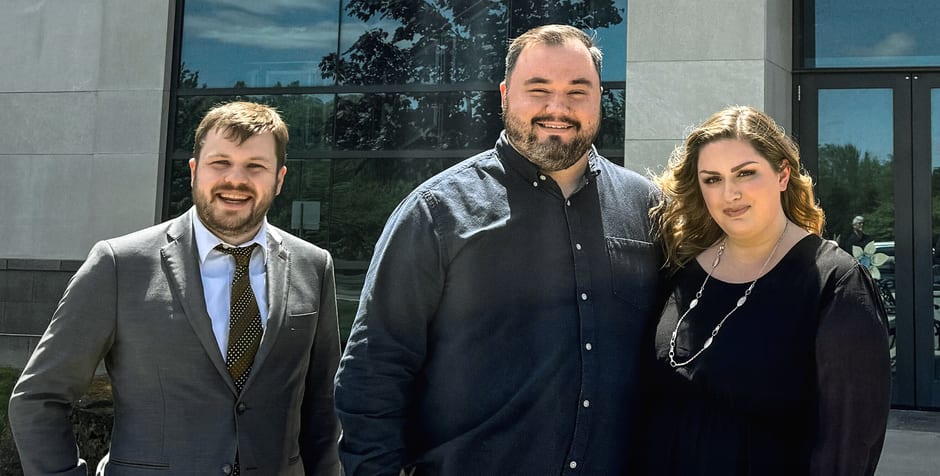Ohio City Arrested a Pro-Life Christian – ACLJ Responds With Powerful Legal Action
Listen tothis article
Religious liberty and the right to speak for the voiceless are under attack across America. In Cuyahoga Falls, Ohio, we’re witnessing a troubling pattern of government discrimination against pro-life advocates – the very people courageously standing on the front lines to defend the most vulnerable among us.
The ACLJ is proud to represent Zachary and Lindsay Knotts, a Christian couple whose sincere religious convictions compel them to spend their Saturday mornings engaging in sidewalk advocacy to save the lives of unborn children. We’ve defeated the criminal case against Mr. Knotts. Now, when the city of Cuyahoga Falls attempted to dismiss its constitutional lawsuit through a motion to dismiss, we filed a comprehensive response brief that exposes the city’s discriminatory practices and unconstitutional ordinance.
When Government Picks Sides
What happened to the Knotts in Cuyahoga Falls should alarm every American who values religious freedom and equal treatment under the law. On December 28, 2024, both the Knotts and abortion clinic escorts were present outside the Northeast Ohio Women’s Center abortion clinic, each group using sound amplification. The Knotts used a small battery-operated megaphone to share their pro-life message amid traffic noise, while the clinic escorts deployed whistles, kazoos, and other noisemaking instruments specifically designed to drown out the Knotts’ life-affirming words.
When the police arrived, they made a telling choice: They arrested only Mr. Knotts – despite never even witnessing him use the megaphone, which had run out of batteries before their arrival. The clinic escorts, engaging in identical conduct, faced no consequences whatsoever.
This discriminatory enforcement reveals a disturbing truth: The city of Cuyahoga Falls has weaponized its noise ordinance to silence pro-life speech while protecting pro-abortion counter-speech. Such viewpoint discrimination strikes at the very core of what the First Amendment was designed to prevent.
A Flawed Law With Unconstitutional Exemptions
The city’s noise ordinance doesn’t just fail in its application – it’s fundamentally flawed in its design. While prohibiting battery-operated megaphones on public sidewalks, the ordinance carves out explicit exemptions for “live outdoor musical or theatrical performances or concerts conducted under the auspices of or on property owned by any educational, charitable, governmental or religious organization.”
This speaker-based discrimination is textbook content-based regulation, requiring strict scrutiny under the Constitution. As we argue in our brief, these exemptions undermine any claimed interest in noise control. How can the city argue it has a compelling interest in preventing “annoying” sounds while simultaneously permitting unlimited noise from favored speakers?
The Supreme Court settled this issue long ago in Saia v. New York (1948), establishing the right to use megaphones subject only to reasonable time, place, and manner restrictions. The Cuyahoga Falls ordinance fails this test spectacularly, covering the entire city at all hours with no alternative channels for pro-life advocates to reach their intended audience.
Vague Standards Enable Discrimination
The ordinance’s prohibition of sounds causing “inconvenience, annoyance or alarm” without defining these terms creates a constitutional nightmare. What annoys one person may be perfectly acceptable to another. Such subjective standards, as the Supreme Court recognized in Coates v. Cincinnati, subject citizens to “an unascertainable standard” and invite arbitrary enforcement.
The Knotts experienced this arbitrariness firsthand. Initially, the police assured Mr. Knotts that his modest use of amplification wouldn’t violate the ordinance. But once officials learned the content of his pro-life message, their interpretation suddenly changed. This selective enforcement based on viewpoint is precisely what the First Amendment forbids.
Religious Freedom Under Fire
For the Knotts, this isn’t just about free speech – it’s about religious liberty. Their sidewalk advocacy flows directly from their deeply held Christian beliefs about the sanctity of human life. They feel called by God to speak for those who cannot speak for themselves.
The city’s ordinance and its discriminatory enforcement burden this religious exercise while granting individualized exemptions to favored speakers. When Mrs. Knotts attempted to file complaints about the abortion clinic escorts’ threatening conduct and noise violations, the officers dismissed her concerns, claiming the threats were “not a crime.” This hostility toward religious pro-life advocates while protecting pro-abortion speakers demonstrates the constitutional violation in stark terms.
The Broader Implications
For over three decades, the ACLJ has stood as a bulwark defending the constitutional rights of pro-life advocates across America. We’ve fought in courts at every level to ensure that those who speak for the unborn can exercise their First Amendment rights without government interference or discrimination. This legal response represents everything we stand for: protecting religious liberty, defending free speech, and ensuring equal treatment under the law for pro-life Americans.
What’s happening in Cuyahoga Falls isn’t isolated. Across the nation, pro-life advocates face increasing hostility from government officials who seem more interested in protecting abortion providers than constitutional rights. This case offers an opportunity to send a clear message that such discrimination will not be tolerated. We face similar cases right now across the country in places like Chicago.
The stakes extend beyond one couple’s right to use a megaphone. If governments can selectively enforce their laws to silence disfavored viewpoints – particularly religious viewpoints – then the First Amendment becomes meaningless. Today it’s pro-life speech; tomorrow it could be any unpopular message.
The Knotts shouldn’t have to choose between following their religious convictions and avoiding arrest. No American should face such a choice. That’s why our legal response pulls no punches in defending their rights and calling out the discriminatory enforcement they faced. We will continue fighting until every pro-life advocate can exercise their constitutional rights without fear of discriminatory enforcement.
